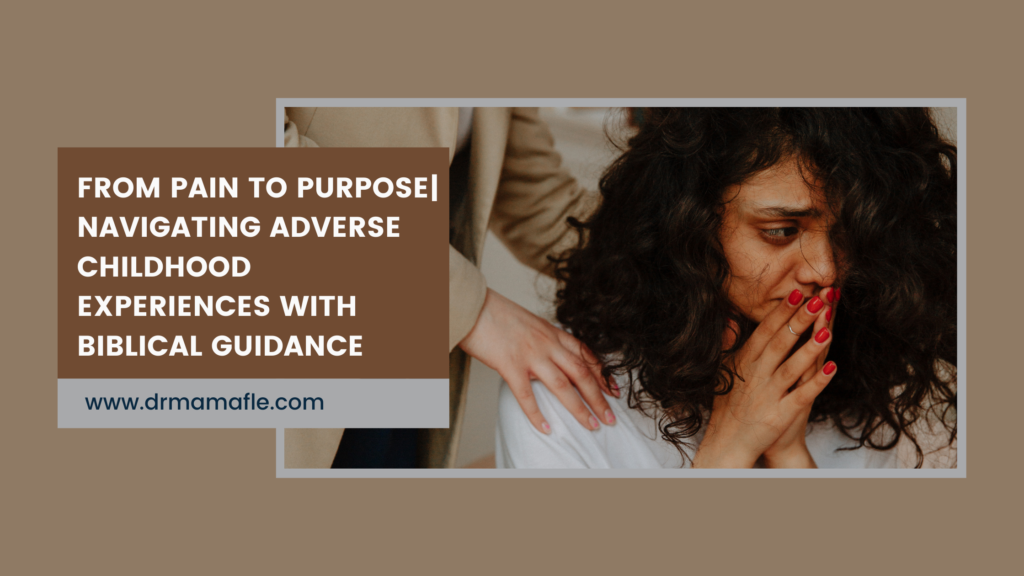Resources
Explore a rich collection of tools, guides, and information designed to create awareness, empower, and support your path to personal growth.
From Pain to Purpose| Navigating Adverse Childhood Experiences with Biblical Guidance

Understanding Adverse Childhood Experiences and Seeking Biblical Counsel in Adulthood
Childhood is often seen as a time of innocence and carefree living. However, for many women, their childhoods were filled with traumatic experiences that have a lasting impact on their adult lives. These experiences, known as adverse childhood experiences (ACEs), can range from physical or emotional abuse to neglect or household dysfunction. It is essential for women to understand what ACEs are and how they can present themselves in adulthood, as well as when it is necessary to seek counsel and the benefits of seeking biblical counsel.
What are Adverse Childhood Experiences?
Adverse childhood experiences (ACEs) are traumatic events that occur during childhood and can have a profound impact on a person’s physical, emotional, and mental well-being. These experiences can include physical, emotional, or sexual abuse, neglect, household dysfunction such as domestic violence or substance abuse, or the loss of a parent through separation or divorce. The more ACEs a person has experienced in their childhood, the higher their risk for various health issues and challenges in adulthood.
How ACEs Present Themselves in Adulthood
Women who have experienced ACEs may find themselves struggling with various challenges in their adult lives. These challenges can manifest in different ways and may include but are not limited to:
1. Mental Health Issues – Women who have experienced ACEs may develop mental health issues such as depression, anxiety, post-traumatic stress disorder (PTSD), or borderline personality disorder. These conditions can greatly impact their daily lives and relationships.
2. Unhealthy Coping Mechanisms – In an attempt to cope with the trauma they experienced in childhood, women may turn to unhealthy coping mechanisms such as substance abuse, self-harm, or disordered eating.
3. Difficulty Forming Relationships – ACEs can make it challenging for women to form healthy relationships. They may struggle with trust, fear of abandonment, or difficulty expressing emotions.
4. Physical Health Issues – Research has shown a strong connection between ACEs and physical health issues in adulthood. Women who have experienced ACEs may be at a higher risk for chronic illnesses such as heart disease, obesity, or diabetes.
5. Low Self-Esteem – ACEs can also negatively impact a woman’s self-esteem and self-worth. They may struggle with feelings of shame, guilt, and unworthiness due to the trauma they experienced.
When to Seek Counsel
It is essential for women to seek counsel when they are struggling with the effects of ACEs in their adult lives. However, it can be challenging for women to recognize when they need help. Some signs that it may be time to seek counsel include:
1. Persistent feelings of sadness, anxiety, or anger that interfere with daily life.
2. Difficulty managing emotions and reactions, leading to conflicts in relationships.
3. Using unhealthy coping mechanisms such as substance abuse or self-harm.
4. Feeling stuck and unable to move forward in life.
5. Struggling with low self-esteem and confidence.
Seeking Biblical Counsel
For many women, seeking counsel may bring up thoughts of therapy and traditional forms of counseling. However, there is another option that can provide guidance and healing for women who have experienced ACEs – biblical counsel.
Biblical counsel is an approach that integrates biblical principles and teachings into the counseling process. It focuses on addressing spiritual and emotional needs through the lens of Christian faith. Here are some ways in which biblical counsel can benefit women who have experienced ACEs:
1. Offers a Safe Space for Healing – Biblical counsel provides a safe and non-judgmental space for women to express their thoughts and emotions. It allows them to discuss their struggles while also incorporating faith and spiritual aspects into the healing process.
2. Addresses Root Issues – Instead of solely focusing on symptoms, biblical counsel helps women uncover and address the root issues of their struggles. It allows them to understand how their past trauma may be impacting their present lives and find healing through God’s love and grace.
3. Encourages Personal Growth – Through biblical counsel, women can develop a deeper understanding of themselves and their relationship with God. It can help them gain the tools and skills they need to grow and thrive in all areas of their lives.
4. Provides a Biblical Perspective – Biblical counsel offers a unique perspective that combines psychological techniques with the wisdom and guidance found in the Bible. It allows women to see their struggles through the lens of faith and trust in God’s plan for their lives.
In conclusion, adverse childhood experiences can have a lasting impact on women’s adult lives. It is crucial for women to understand what ACEs are and how they can manifest in their daily lives. Seeking counsel, whether it be traditional therapy or biblical counsel, can provide healing and guidance for women who are struggling with the effects of ACEs. Through the integration of faith and biblical principles, women can find hope, healing, and growth on their journey towards wholeness.
Send a Message
Frequently Asked
Donec rutrum congue leo eget malesuada.
Vestibulum ac diam sit amet quam vehicula elementum sed
Donec sollicitudin molestie malesuada.
Curabitur aliquet quam id dui posuere blandit.
Curabitur arcu erat, accumsan id imperdiet et.
Online Coaching Resources

Wellness eBook
Lorem ipsum dolor sit amet, consectetur adipiscing elit. Etiam varius purus nec lobortis vulputate.

The Essentials of Goal Setting
Lorem ipsum dolor sit amet, consectetur adipiscing elit. Etiam varius purus nec lobortis vulputate.

3 Week Career Workshop
Lorem ipsum dolor sit amet, consectetur adipiscing elit. Etiam varius purus nec lobortis vulputate.
